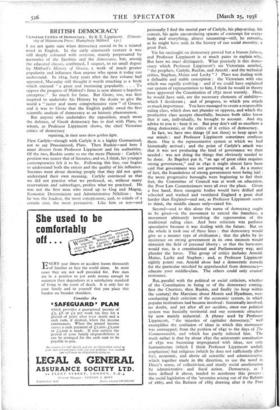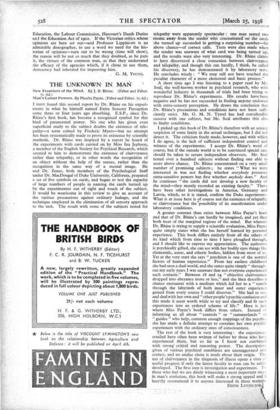BRITISH DEMOCRACY
Victorian Critics of Democracy. By B. E. Lippincott. (Univer- sity of Minnesota Press : Humphrey Milford. mss.)
I AM not quite sure when democracy ceased to be a tainted word in English. In the early nineteenth century it was still deeply coloured with aversion, mainly perpetuated by memories of the Jacobins and the ddrnocrates, but, among the educated classes, confirmed, I suspect, to no small degree by Mitford's History of Greece, a work of much greater popularity and influence than anyone who opens it today can understand. In 1824, forty years after the first volume had appeared, Macaulay still thought it worth attacking as a book which enjoyed " a great and increasing popularity. . . . To oppose the progress of Mitford's fame is now almost a hopeless enterprise." So much for fame. But Grote, too, was first inspired to undertake his History by the desire to give the world a " juster and more comprehensive view " of Greece, and it was to Grote that the English public owed the first scientific analysis of democracy as an historic phenomenon.
But anyone who undertakes the exposition, much more the defence, of Greek democracy has to deal with Plato, to whom, as Professor Lippincott shows, the chief Victorian critics of democracy
repairing, in their urns drew golden light.
First Carlyle—though with Carlyle it is a highly Germanised, not to say Prussianised, Plato. Then Ruskin—and here I must dissent from Professor Lippincott and his authorities. Of the two, Ruskin seems to me the more Platonic : Carlyle's position was nearer that of Socrates, and so, I think, his younger contemporaries felt it to be. Following this line, one begins to understand both the extent and the quality of his influence. Socrates went about showing people that they did not quite understand their own meaning. Carlyle convinced us that we did not practise what we professed, or, without many reservations and subterfuges, profess what we practised. He was not the first man who stood up to Gog and Magog, Economic Determinism and Administrative Nihilism : but he was the loudest, the most conspicuous, and, to minds of a certain cast, the most persuasive. Like him or not—and
personally I find the mortal part of Carlyle, his play-acting, his conceit, his quite unconvincing spasms of contempt for every- body and* everything, almost nauseating—still, he remains, as he might have said, in the history of our social morality, a great Fact.
Yet his onslaught on democracy proved but a brutum fulmen, and Professor Lippincott is at much pains to explain why. But here we must distinguish. What precisely is this demo- cracy which Professor Lippincott's six Victorians asSailed, " the prophets, Carlyle, Ruskin, and Arnold : and the technical critics, Stephen, Maine and Lecky " ? Plato was dealing with a definable and stable conception : the Victorians with one which was rapidly evolving : and if we could have explained our system of representation to him, I think he would in theory have approved the Constitution of 1832 most warmly. Here, he would have said, are the necessary elements of stability— which I desiderate ; and of progress, to which you attach so much importance. You have managed to create a responsible ruling class, which does not plunder or oppress, and which the productive class accepts cheerfully, because both sides know that it can, individually, be brought to account. And my advice to you is : keep it so. But pray don't call so excellent a thing democratic, or the critics of it critics of democracy.
In fact, we have two things (if not three) to keep apart in our minds : and Professor Lippincott sometimes confuses them. One is the representative system at which we had historically arrived ; and the point of Carlyle's attack was that it was not producing the kind of governance we then needed : was not doing the things that obviously needed to be done. As Bagehot put it, "an age of great cities requires strong government," and in 1840 it might almost have been said that government was not governing at all. As a matter of fact, the foundations of strong government were being laid : the more progressive boroughs were beginning to feel their feet, the Committee of Council was at work on education, the Poor Law Commissioners were all over the place. Given a free hand, these energetic bodies would have drilled and schooled and washed and ventilated England a great deal harder than England—and not, as Professor Lippincott seems to think, the middle classes only—cared for.
Second—and to this alone the name of democracy ought to be given—is the movement to extend the franchise, a movement ultimately involving the supersession of the traditional ruling class. And here criticism was perforce speculative because it was dealing with the future. But on the whole it took one of three lines : that democracy would give us a meaner type of civilisation ; that the plebs by its insistence on strong government in its own interests would diminish the field of personal liberty ; or that the have-nots would rise, in a constitutional and Parliamentary way, and plunder the haves. This group of critics includes Arnold, Maine, Lecky and Stephen : and, as Professor Lippincott rightly points out, Arnold alone had a democratic remedy for the particular mischief he apprehended from democracy— educate your middle-class. The others could only counsel resistance.
But, parallel with the political or social criticism, whether of the Constitution in being or of the democracy coming, first the Chartists, then Ruskin, and finally (to keep within the century) the Marxians about Morris and Hyndman, were conducting their criticism of the economic system, in which popular institutions had become involved : historically involved, no doubt, and yet after all per accidens, since our political system was basically territorial and our economic structure by now mainly industrial. A phrase used by Professor Lippincott, " the injustice of capitalist -democracy," well exemplifies the confusion of idea in which this movement was enwrapped, from the petition of 1842 to the days of The Commonwealth, and which has partly infected him. The truth rather is that by about 1850 the aristocratic constitution of 1832 was becoming impregnated with ideas, not only humanitarian (which I think Professor Lippincott unduly emphasises) but religious (which he does not sufficiently allow for), economic, and above all scientific and administrative, which together made in die direction, to use the word in Dicey's sense, of collectivism, and steady social amelioration by administrative and fiscal action. Democracy, as I have defined it above, tended to accelerate this process : the social legislation of the 'seventies arising out of the Reform of 1867, and the Reform of s885 drawing after it the Free Education, the Labour Commission, Harcourt's Death Duties and the Education Act of 1902. If the Victorian- critics whose opinions are here set out—and Professor Lippincott is an admirable doxographer, to use a word we need for the his- torian of opinions—turn out to be wrong (time will show), the reason will be not so much that they doubted, as he puts it, the virtues of the common man, as that they underrated the efficacy of the agencies which, if it chose to use them, democracy had inherited for improving him.
G. M. YOUNG.











































































 Previous page
Previous page